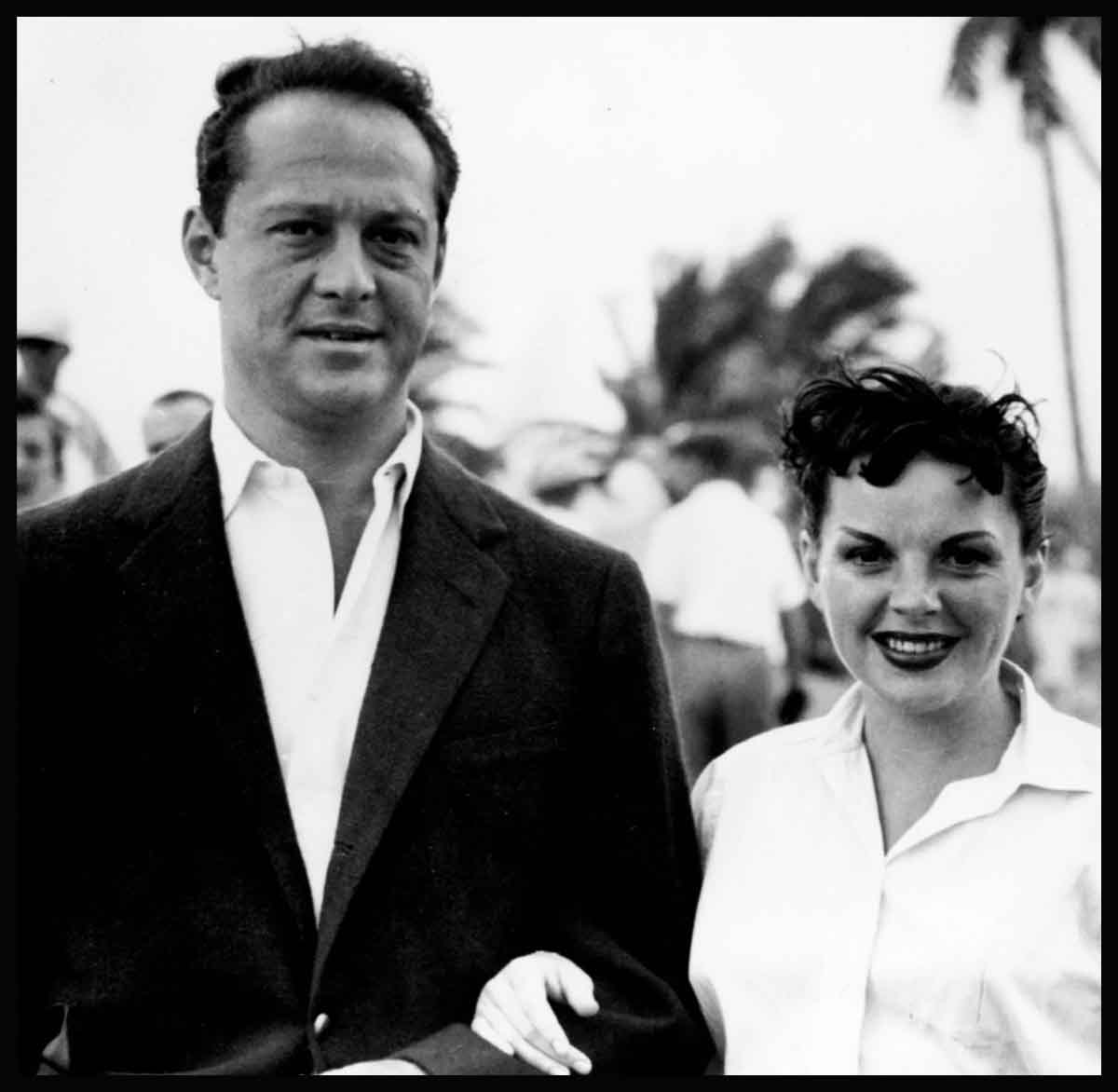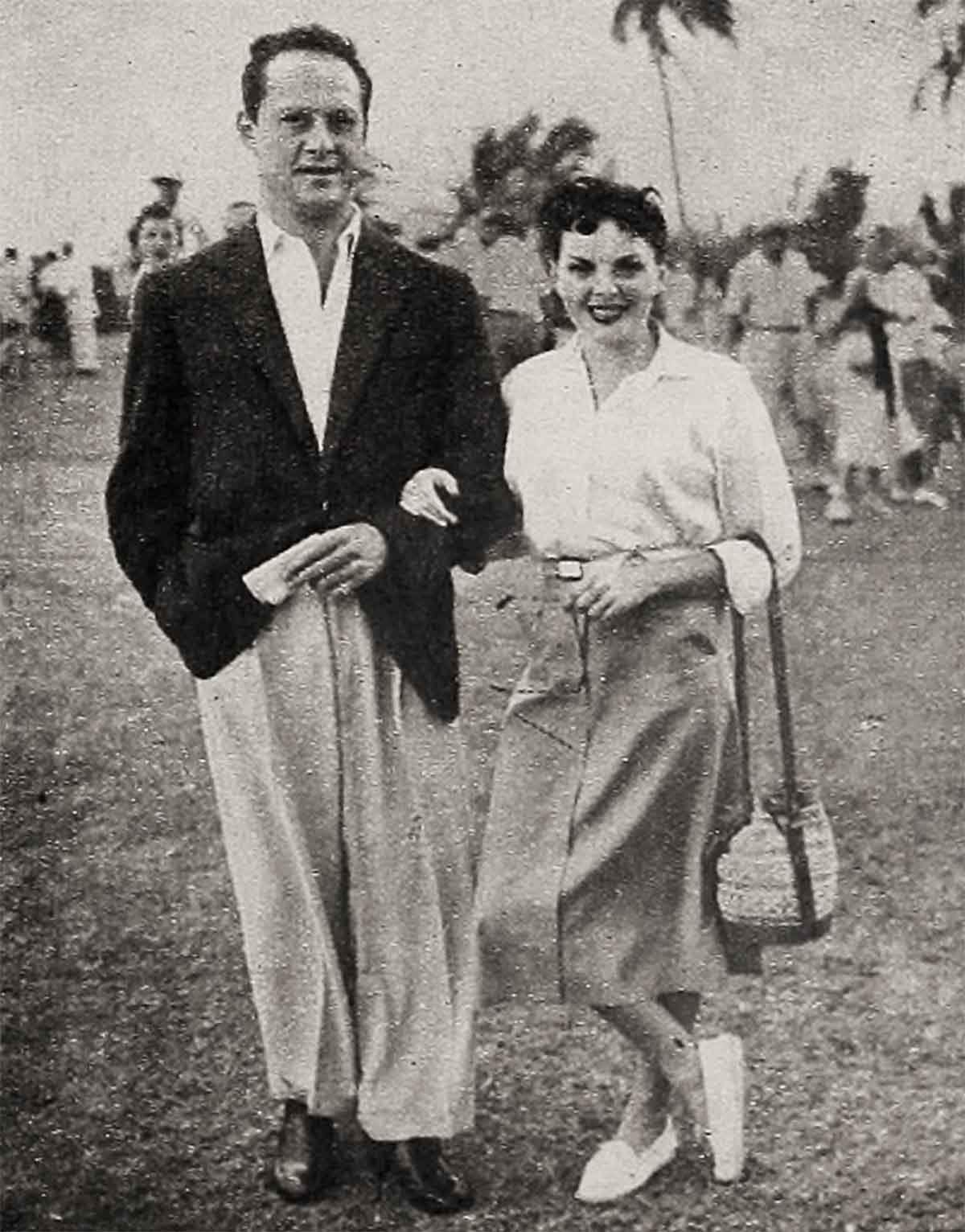
Hollywood’s Most Passionate Loves—Judy Garland & Sid Luft
When Judy Garland came back to Hollywood three months ago, reporters who met her train in Pasadena were surprised to learn that she had made the triumphant homeward trek without the man she loves.
“Where is Sid Luft?” everyone asked.
Judy ignored the question. Anxiously she looked about the station platform for her daughter, Liza. Catching sight of her, Judy stretched out her arms and Liza raced into them.
The reporters waited a respectable two minutes while Judy smothered the child. Then they moved in with a barrage of questions.
Was it true that Judy had earned $750,000 in her 20-week stint at New York’s Palace? She didn’t know the exact figure, but that was about right.
Had Judy fought with Sid Luft in Palm Springs on their vacation? Was that why he wasn’t along? No answer.
Did Miss Garland have any intention of returning to motion pictures? Yes, but she had no definite plans.
Any truth that Miss Garland was already married to Sid Luft, had, in fact, eloped with him to Cuba? Ridiculous!
How did she feel about being back in California? Just wonderful.
Did she have any plans for the immediate future? Yes, she would do her vaudeville act in Los Angeles, then repeat in San Francisco. She would finish there by June 21st or 28th.
Was it true that Miss Garland planned to marry Sid Luft as soon as her divorce from Vincente Minnelli was final? Judy turned beet red. “How dare you ask that question in front of my child?” she stormed. “Don’t you have any common sense?”
Judy divorce from 44-year-old Minnelli became final on April ninth. He promised to pay Judy $500 a month for the support of Liza, aged five, and gave up completely any interest in Judy’s Malibu Beach house. Judy, in turn, paid him $25,000 for his interest in the home they lad shared in the Hollywood hills.
As soon as this final decree was entered in the Superior Court, it was expected that Judy would elope with Sid who had flown into town a day after her arrival.
The day after her decree, however, she didn’t rush to the preacher; she took Liza for a drive to Palm Springs.
“We had a nice quiet rest,” she recalls. “We talked and took walks, and then when it turned hot, we drove back home. It was a pleasant, simple Easter vacation. Liza and I both had a wonderful time.”
“But everyone expected you and Sid to get married,” said an omnipresent reporter.
Judy grinned. “I know,” she admitted. “What’s the big hurry? Sid and I have each been married before, and we don’t take marriage lightly. I love him, and he’s definitely my fella. If the relationship continues as it has, we’ll do it. But we’re not a couple of kids who’ve got to get married this very minute or else.
“Some time during the middle of summer or maybe even before that when things slack off, well get married. Right now, there are shows to do, rehearsals, a million and one details, and I’m not going to sandwich a wedding in between.”
What a change from the frightened actress who once felt that she must live every day as if it were her last, from the Judy Garland who once felt that no man really considered her desirable.

At 29, Judy has finally grown up. She has developed a realistic sense of values. She realizes that there is more to marriage than the passion she once thought was all-important.
Sid Luft, she knows, is responsible for her confidence, her comeback, her present happiness. When he’s near her, she feels that everything will be taken care of, nothing will disturb her.
Yet, she is wise enough to know that Sid, too, is fighting a battle, making a comeback, regaining his stature.
It is no secret, for instance, that when Sid first met Judy, his financial condition was none too good.
As a matter of fact, his ex-wife, Lynn Bari, testified that at various times in their unhappy marriage, she had given him $16,000 in cash, $13,000 in property equity, and that after their divorce, he was delinquent in his support of their son, John.
To friends she confided her bewilderment at Luft’s ability to take Judy dining and wining at expensive restaurants while he was $3,000 in arrears.
After Judy opened at the Palladium in London, and Luft flew over to manage her appearances, his financial affairs began to improve.
Upon returning to Los Angles, he immediately took care of his delinquent support payments with a check for $2,889.
Everyone talks about how wonderful Sid has been for Judy. It works both ways. Judy has been the anodyne for everything that troubled Luft.
Before he met her, Luft had been one of those handsome, personable men-about-own who somehow find it extremely difficult to settle down and specialize in any one type of work.
For a short while he worked as confidential secretary to Eleanor Powell. Then he joined the Canadian Air Force as a pilot officer. The pay was low, the prestige high. Later he worked in picture production, aircraft plants, and according to friends, “conducted an enterprise connected with horse-racing.”
His best job, to date, however, has been as Judy Garland’s personal manager, a job which has given him money, position, confidence, and the reputation of being a very shrewd cookie whose sole aim is Judy’s welfare.
Sid is the organizer of M.S. Luft Productions, a company of which Judy is the principal asset. He has hopes of making a musical version of A Star Is Born, the old Selznick classic about Hollywood. It would be an independent venture and Judy’s motion picture comeback.
One of Judy’s closest friends is of the opinion that Judy will not marry Luft until Sid gets on his feet financially. The way Luft’s been going this past year, he should have a substantial bank account very soon.
This thinking about money is another indication of the startling change which has taken place in Judy.
Three years ago, when she was drawing $5,500 a week from Metro, she had no interest in finance. Money poured through her fingers like water.
Nowadays she takes an interest in her earnings, discussing various investment practises with Sid and Abe Lastvogel of the William Morris Agency.
When Sid suggested that Judy might earn considerable royalties by making a record album for RCA Victor, and use those earnings to rent an apartment in New York, she checked the rent, the possible income and went ahead with the deal.
She is also investigating annuities and a trust fund for Liza.
Judy has been in show business her entire life, and she has seen what happens to men whose sole occupation is the management of their wives’ careers.
Some of these men deteriorate into messenger boys.
Others develop into full-fledged stage producers, entrepreneurs of great acumen managers of distinction who branch out into allied fields.
Suppose after a few years of marriage to Luft, something happens to Judy, and she is unable to continue her career. What happens to Luft?
Judy herself won’t discuss this with anyone, but she has thought about it, because she has developed a sense of realism.
What sort of step-father will Sid make? How will he treat Liza? How will Liza take to him? What sort of step-mother will I be to his son, John? Where will we live? Will we have any children? Won’t we get on each other’s nerves, not only living but working together? Can a man devote his whole life to a woman? Isn’t there always time for marriage?
These are some of the questions Judy was asking herself several weeks ago. This was the type of introspection she never indulged in prier to her other marriages. This is why she said, “I don’t think Sid and I will possibly get married before July or August. Working together as Manager and artist, you know, is a good deal different from living together as man and wife.”
Luft, too, is in no particular hurry. He loves Judy and has found the secret of keeping her happy—work and independence. But he knows, too, that she is a high-strung girl who requires careful handling. This is no easy job, especially for a fellow like Sid who’s always relished his freedom and self-reliance.
As long as they have doubts, Judy and Sid won’t make a move toward marriage. If by chance they have, as you read this article then rest assured that it was only after the clouds of doubt had disappeared. For at 29, Judy has finally put passion in its place.
THE END
—BY ARTHUR L. CHARLES
It is a quote. MODERN SCREEN MAGAZINE JULY 1952




